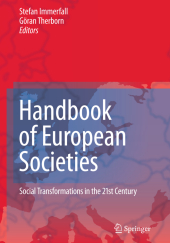 Neuerscheinungen 2010Stand: 2020-01-07 |
Schnellsuche
ISBN/Stichwort/Autor
|
Herderstraße 10
10625 Berlin
Tel.: 030 315 714 16
Fax 030 315 714 14
info@buchspektrum.de |

Stefan Immerfall, Göran Therborn
(Beteiligte)
Handbook of European Societies
Social Transformations in the 21st Century
Herausgegeben von Immerfall, Stefan; Therborn, Göran
2010. xxxii, 686 S. 119 Tabellen. 254 mm
Verlag/Jahr: SPRINGER, BERLIN 2010
ISBN: 1-441-98128-4 (1441981284)
Neue ISBN: 978-1-441-98128-8 (9781441981288)
Preis und Lieferzeit: Bitte klicken
Societal trends in Europe have never been studied systematically. This book rectifies that. It analyzes current social patterns in Europe, covering major topics of social concern and sociological relevance such as Consumption, Power Structure and Sexuality.
European integration is one of the most ambitious and socially far-reaching developments in world politics and in world economics. Against growing opposition and despite increasing social heterogeneity, the European Union continues to expand and to acquire new competences. But to what extent is the self-proclaimed "ever closer union among the peoples of Europe" a social reality? In which ways is the political European project anchored in social developments? How does social change impinge upon political integration?
Societal trends in multi-cultural, multi-ethnic, multi-lingual and socially diverse Europe have never been studied systematically. Handbook of European Societies: Social Transformations in the 21st Century sets to rectify this neglect of societal developments in Europe, providing a groundwork for the sociology of European integration. The book portrays social life and social relations in the enlarged Europe, and gives a perspective on the European Union as an evolving social entity.
Handbook of European Societies is a pioneering source book analyzing the current social patterns on the continent. It covers a representative selection of major topics of social concern and sociological relevance, such as Collective Action, Consumption, Identity, Power Structure, Sexuality, Stratification and Well-being. Each contribution probes key developments in a strictly comparative manner. The Handbook thus offers a detailed look into the intricacies of the national societies of Europe and into the prospect of an emerging European society.
The Editors have enlisted leading researchers to synthesize existing knowledge and to make use of many different data sources in a straight-forward style. The contributions stay away from jargon, simple labeling and sweeping assertions. Instead, they provide solid and accessible information on a wide variety of social trends and processes within and across European societies.
IntroductionStefan Immerfall and Göran Therborn
Chapter 1: Associations and CommunityStefan Immerfall, Eckhard Priller, and Jan Delhey
Chapter 2: Bureaucracy and the StateGuy B. Peters
Chapter 3: CitiesPatrick Le Galès and Göran Therborn
Chapter 4: Political TransformationsSten Berglund and Joakim Ekman
Chapter 5: Collective ActionDieter Rucht
Chapter 6: Crime and JusticeRosemary Barberet and Matti Joutsen
Chapter 7: CultureJürgen Gerhards
Chapter 8: EducationWalter Müller and Irena Kogan
Chapter 9: Elites and Power StructureMichael Hartmann
Chapter 10: IdentityStefan Immerfall, Klaus Boehnke, and Dirk Baier
Chapter 11: Leisure and ConsumptionJukka Gronow and Dale Southerton
Chapter 12: Life CourseHeather Hofmeister
Chapter 13: PopulationTony Fahey
Chapter 14: Religion and ChurchesRoberto Cipriani
Chapter 15: Sexuality and Family FormationElina Haavio-Mannila and Anna Rotkirch
Chapter 16: Stratification and Social MobilityPéter Róbert
Chapter 17: TransnationalitySteffen Mau and Sebastian Büttner
Chapter 18: Welfare StatesThomas Bahle, Jürgen Kohl, and Claus Wendt
Chapter 19: Well-being and InequalityPetra Böhnke and Ulrich Kohler
Chapter 20: Conclusion: European Integration and the Elusive European Dream Stefan Immerfall and Göran Therborn


